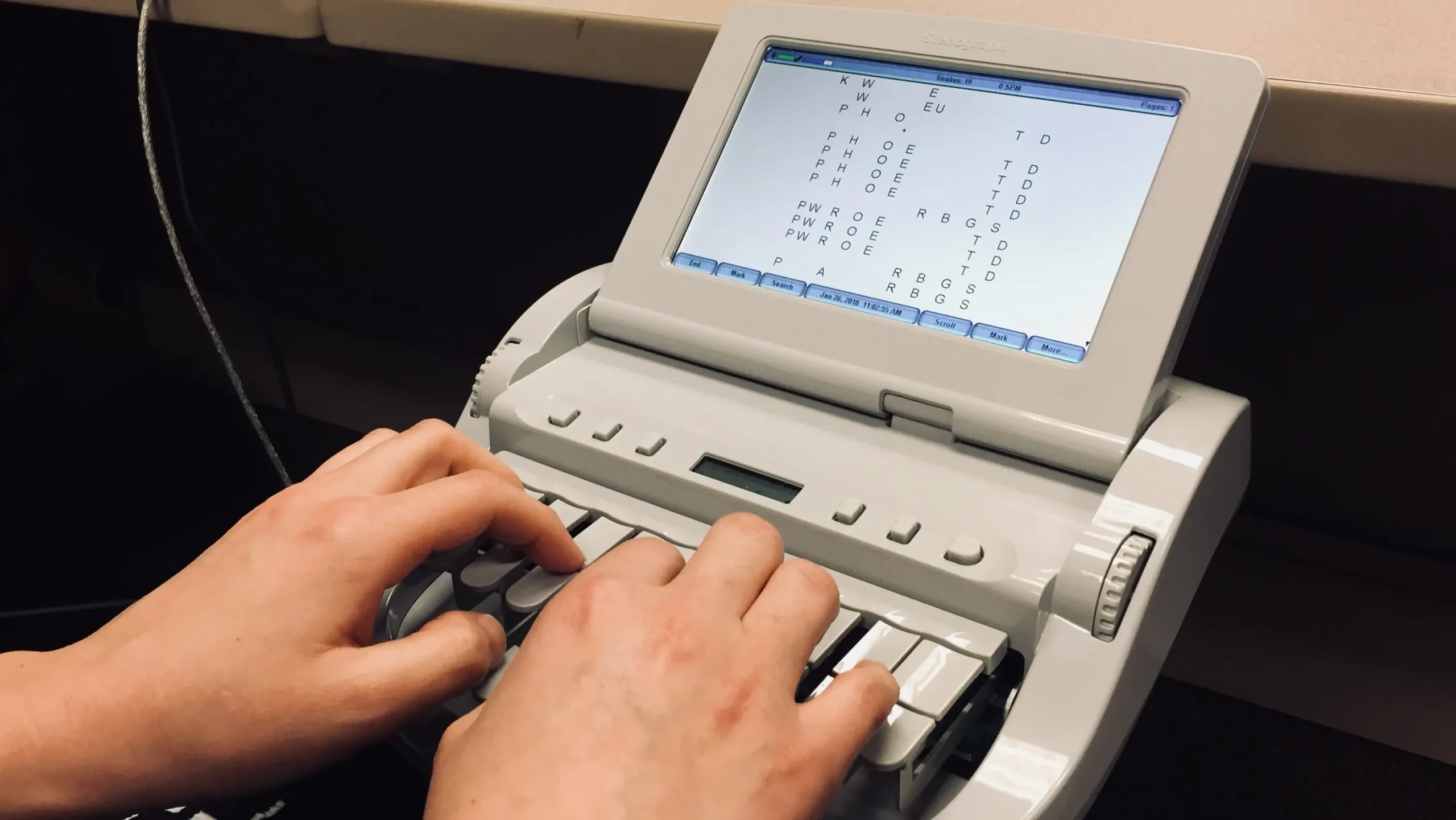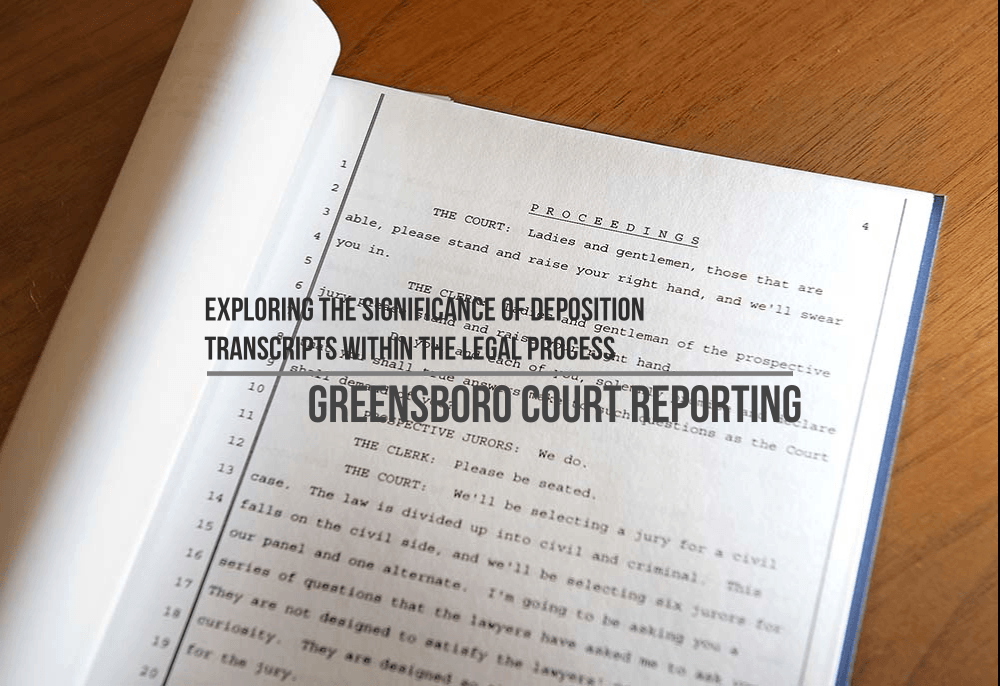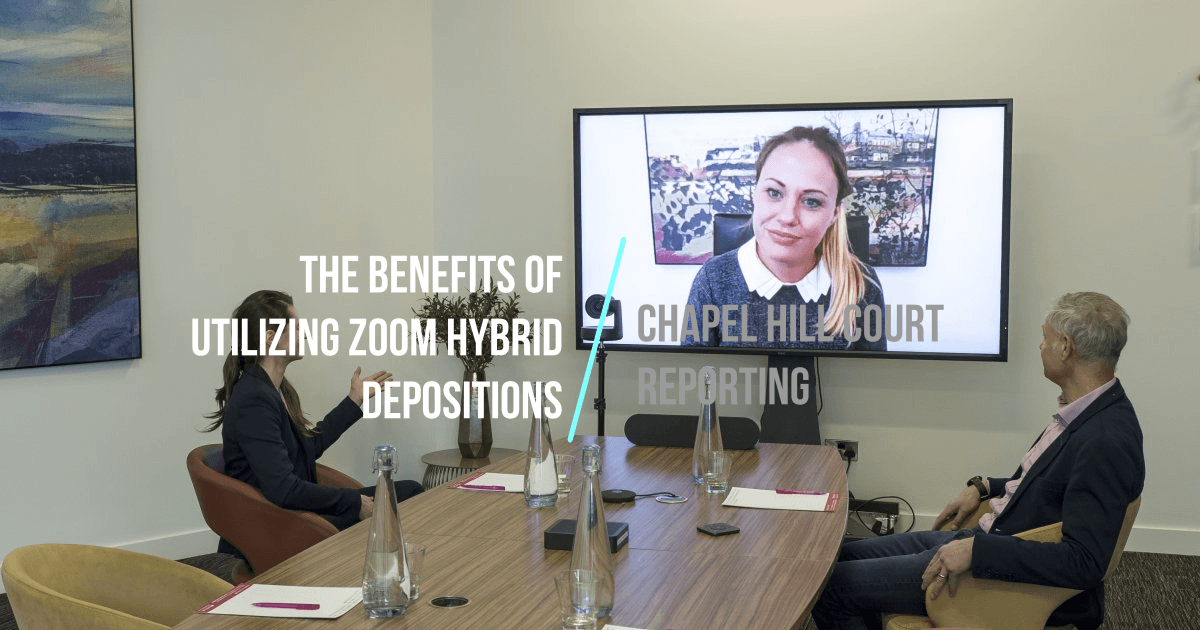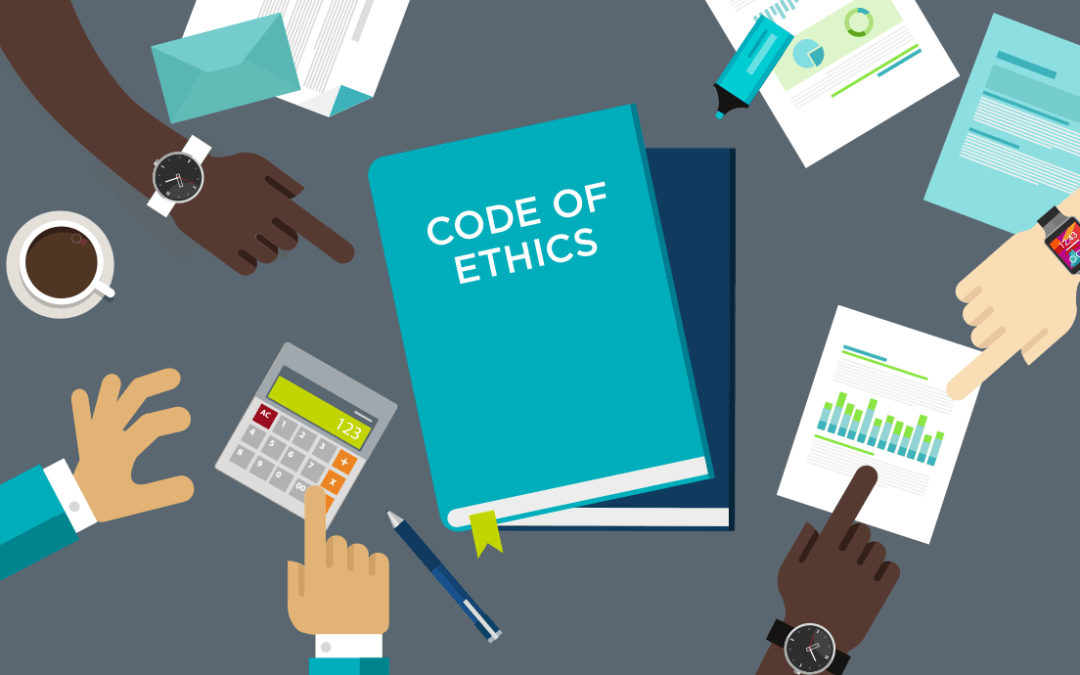Category: Uncategorized
Using an Interpreter Effectively in a Deposition

The Importance of Court Reporting in Greensboro, North Carolina

Exploring the Significance of Deposition Transcripts within the Legal Process

Deposition transcripts play a crucial role in the legal process, enabling attorneys to obtain sworn testimony from witnesses and construct their cases. The significance of deposition transcripts cannot be understated, as they serve as invaluable assets that shape legal proceedings and facilitate effective case preparation. In this blog post, we will delve into the importance of deposition transcripts and shed light on how they influence the legal landscape.
1. Preserving an Unalterable Record
Deposition transcripts serve as an unchangeable record of witness testimony given under oath. They capture the precise words spoken during the deposition, preserving the intricacies of the process. These transcripts become vital resources for attorneys as they review and analyze witness statements, identifying inconsistencies or contradictions that may arise and enabling them to develop appropriate strategies. The accuracy and precision of deposition transcripts play a critical role in ensuring justice and fairness within the legal system.
2. Indispensable for Discovery
Deposition transcripts serve as indispensable tools during the discovery phase of a case. Attorneys rely on these transcripts to gain valuable insights into the opposing party’s stance, bolster their arguments, and uncover potential evidence. By carefully studying the deposition transcripts, attorneys can identify key points that can be used to challenge witnesses during cross-examinations or support the testimonies of their own witnesses. These transcripts are invaluable for developing a comprehensive understanding of the case and formulating effective legal strategies.
3. Constructing a Compelling Case
Deposition transcripts provide attorneys with a wealth of information to construct a strong and persuasive case. By examining witness statements, attorneys can pinpoint favorable or damaging testimony that can significantly impact the case’s outcome. These transcripts allow attorneys to thoroughly prepare for trial, highlighting inconsistencies, contradictions, or credibility issues that can be leveraged to challenge opposing witnesses or corroborate their own client’s version of events. Armed with thorough deposition transcripts, a well-prepared attorney can present a compelling case and navigate the intricacies of the legal process with confidence.
4. Fostering Collaborative Case Preparation
Deposition transcripts facilitate collaborative case preparation among legal teams. Attorneys can share and discuss deposition transcripts with colleagues, paralegals, and experts to gain diverse perspectives and insights. These transcripts serve as the foundation for discussions and strategic planning, enabling the legal team to collectively analyze and interpret the information contained within them. Such collaboration enhances the overall quality of case preparation, ensuring that all aspects of the case are meticulously examined.
5. Documentation for Future Reference
Deposition transcripts also serve as valuable documentation for future reference. Attorneys can refer back to these transcripts during trial, redirecting witnesses or refreshing their memory on specific points raised during depositions. Moreover, deposition transcripts can be utilized for post-trial analysis, appeals, or any subsequent legal proceedings. They serve as permanent and reliable sources of information, allowing attorneys to revisit witness testimonies accurately and effectively.
Deposition transcripts constitute an integral part of the legal process, providing a verbatim account of witness testimony that can significantly influence the outcome of a case. They serve as crucial resources for attorneys during case preparation, discovery, and trial, enabling them to construct compelling arguments, challenge witnesses, and craft persuasive narratives. The accuracy, comprehensiveness, and accessibility of deposition transcripts contribute significantly to the pursuit of justice and the seamless functioning of the legal system.
The Crucial Role of the Production Department in Court Reporting Agencies

Behind every successful court reporting agency, there is a dedicated and skilled production department working diligently to ensure the accuracy, accessibility, and seamless delivery of legal transcripts and related services. This often unsung team plays a crucial role in the overall functioning of the agency, ensuring that the final product meets the highest standards of quality and professionalism. In this blog, we will delve into the significance of the production department in court reporting agencies and shed light on their essential responsibilities.
1. Transcript Indexing and Exhibits Management
Court cases typically involve a multitude of exhibits, documents, and other supporting materials. The production department plays a vital role in organizing and managing these items within the transcripts. They meticulously index exhibits, create hyperlinks, and embed them within the electronic transcript. This allows attorneys and other legal professionals to conveniently navigate through the record and access relevant exhibits with ease, saving valuable time during case preparation and review.
2. Transcript Quality Control
Maintaining a high standard of quality is paramount in court reporting agencies. The production department serves as the last line of defense, conducting rigorous quality control checks on the transcripts before they are delivered to clients. They meticulously review the document for accuracy, completeness, and adherence to agency guidelines. This ensures that the final product meets the expectations of clients and is ready to be used in legal proceedings.
3. Transcript Delivery and Accessibility
Efficient and timely delivery of transcripts is crucial in the legal field. The production department manages the logistics of transcript delivery, employing various methods such as secure file transfer, email, or physical media. They are responsible for ensuring that the transcripts reach the intended recipients promptly and securely. Additionally, the production team also plays a role in enhancing accessibility by providing transcripts in alternative formats, such as large print, Braille, or electronic formats compatible with assistive technologies, to accommodate individuals with disabilities.
4. Technology Integration and Advancements
In today’s digital age, court reporting agencies rely heavily on technology to enhance their services. The production department plays a pivotal role in keeping up with technological advancements and integrating them into their workflows. They work closely with other technology partners to optimize productivity, implement advanced transcription tools, and explore innovative solutions to streamline the production process.
The production department is an indispensable component of court reporting agencies, ensuring that legal transcripts are meticulously prepared, formatted, and delivered with accuracy and efficiency. Their commitment to quality control, transcript indexing, exhibit management, and embracing technology advancements contributes significantly to the overall success of the agency. Without the expertise and dedication of the production department, the vital services provided by court reporting agencies would not be possible, making them an essential pillar of the legal profession.
What Is A Court Reporter?

A court Reporter is a highly skilled professional that is trained in the ability to convert spoken words into information that can be read.
What Does A Court Reporter Do?
A Court Reporter, also commonly known as guardians of the record, their role is to capture spoken words by every party involved during a proceeding while keeping up with the pace. They are tasked with the responsibility of making sure they have accurate information and proper spellings. Court Reporters want to provide you with the most accurate transcript possible, so they often are tasked to make sure that parties are not talking over each other and that everyone is able to completely finish their sentences before another person speaks. Because every proceeding is different, court reporters have to be adaptable and have to stay on top of everything to provide you with top-notch service. Court reporters can also be tasked with the handling and presentation of the exhibits during a deposition.
After The Deposition
After the deposition, the court reporter will answer any questions or concerns you may have in regards to the transcript, format, or turnaround times. Now the court reporter is left with going back to their office and converting the information they gathered during the proceeding into a transcript that can be read by parties later on.
Where To Find A Court Reporter?
Here at Greensboro Court Reporting, we provide top-notch litigation services at affordable prices and one-stop shopping for all your court reporting, legal videography, and web-streaming needs. Greensboro Court Reporting has you covered. With more than a decade of experience serving the Greensboro area, let Greensboro Court Reporting put its expertise to work for you. We have worked with government offices, universities and schools, hospitals and medical companies, banks, energy companies, and many more. Our services have been utilized for cases ranging from Medical Malpractice, Business Litigation, Personal Injury, Construction Defect Claims, Antitrust, Professional Liability, and Aviation Litigation. Call us now to schedule your next deposition (336)-790-1819 .
Zoom Depositions – Some Helpful Tips

Due to COVID-19, there has been a big upswing in Zoom depositions. Zoom depositions have been on the rise just due to economic reasons, but now with social distancing, they are being used much more commonly. Greensboro Court Reporting has been using Zoom technology for years and would like to offer some pointers.
1. Make sure you run a test with the reporting agency so you can work out any bugs prior to the deposition
2. Send all exhibits you think you might use to the reporting agency 24 hours in advance so they have time to print the exhibits and get to the reporter covering the deposition
3. Please be ready at least 15-20 minutes early. This allows you to check your sound and video. Our reporters are usually on 30 minutes early to troubleshoot anyone who is having any problems so the depo can still start on time.
4. Use a headset if you have one available.
5. Speak slowly and make sure you allow the witness to finish his/her answer. Zoom is much like doing a teleconferenced deposition. If you start to speak over the witness or another attorney, the reporter WILL miss someone talking. This does take some cooperation between everyone but it gives you a much more accurate record.
6. Please be aware that if you are using an external mic where it is placed. If you are typing and the mic is close to you, we can hear you type and it’s very disruptive.
7. Please try to keep outside noises to a minimum. This includes remembering when you are having your lawn mown. Lately we have had that as an interruption and had to take breaks when the lawn mower went by the window of the attorney attending the Zoom depo from his house.
8. If there are multiple attorneys attending, please be aware that when you object, you should go one at a time and it should go like this: Smith, objection to form. Ahern, I also object. Johns, join. Please say your last name and then the objection so the reporter does not have to guess who is objecting. It just makes for a more accurate record and less interruptions from your reporter.
9. At the conclusion of the deposition, please don’t just hang up, please allow the reporter to ask some questions as far as what you would like to order and whether the witness would like to read their depo or waive it.
To schedule your next Zoom depositions with Greensboro Court Reporting, please call us at 336-790-1819 or schedule online.
Court Reporters in the News

Court reporters are used to being the Rodney Dangerfield of the courtroom – we can’t get no respect! Sometimes it seems that no one truly understands and respects what hardworking court reporters do to preserve a verbatim record of deposition and courtroom proceedings.
MSNBC’s Rachel Maddow often reads from court transcripts on the air, and at the end of a recent show took a few minutes to give a shout-out to court reporters.
https://twitter.com/MaddowBlog/status/1231029767509594118
Maddow said:
I do want to end with a special shout-out to all of the court reporters out there. It is really hard to get detailed, perfect court transcripts turned around same day so that we in the news media can read from them on the same day the court proceedings happen to let the public know what happened. There usually aren’t cameras or even recording devices in federal courts, and when something important happens in the federal courts it takes not a computer, but a human, a really really hard day’s work to get that stuff turned around so that we can present that material on TV and you can get the next best thing to being there. Thank you to all the court reporters. Someday I will be reincarnated as one if I am really good in this life.
Her comments showed that she truly understands what an important and strenuous job court reporters have and were very informative for viewers who might not really know what court reporters do and what goes into turning around realtime or same-day transcripts. Thank you, Rachel, for highlighting our hard work!
Court Reporting Ethics 101

As “Guardians of the Record,” court reporters provide a crucial role in our justice system, and they take ethical requirements seriously. All court reporters are subject to ethics rules, whether they’re imposed by a professional organization or a state licensing body. While the specific examples may vary, the principles of impartiality and confidentiality are found in any Court Reporting Code of Ethics.
Impartiality:
Court reporters must always act in a fair and impartial manner toward everyone involved in a proceeding. They should not give any opinion on the veracity of one witness or another or on the merits of the case. A court reporter should not provide a different quality of service from one party over another, and if there is any potential for a conflict of interest, they should disclose their relationship to the case—for example, the court reporter could be related to an attorney or party.
Court reporters should also avoid the practice of “incentive gifting,” which is a direct reward given in exchange for scheduling a future deposition. Such a practice can be seen as a type of “kickback,” creating a relationship with one side that doesn’t exist with the other.
Confidentiality:
Confidentiality is a critical aspect of our justice system. Court reporters have access to many types of confidential information, including business, financial, trade secret, and medical records. If deponents did not believe their testimony would be kept confidential they may hesitate to answer questions openly and honestly.
Court reporters should not talk about the substance of any deposition testimony with anyone, period.
Also, court reporters should not expose or sell a deposition transcript to anyone other than the parties without the consent of all parties involved. If the record is made public, however, the court reporter may sell the transcript to the public with or without the parties’ consent. If a non-party seeks a non-public transcript, they must do so through a legal process such as a subpoena or court order.
Being a guardian of the record entails more than just capturing and producing a verbatim record of deposition or courtroom testimony; it requires court reporters to strictly adhere to the ethical principles of impartiality and confidentiality.
You can put your trust in Greensboro Court Reporting that our court reporters understand the ethics involved in court reporting. Please call now to book your deposition: 336-790-1819 or you can schedule online.